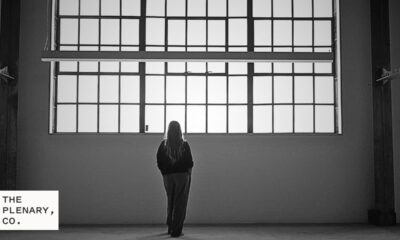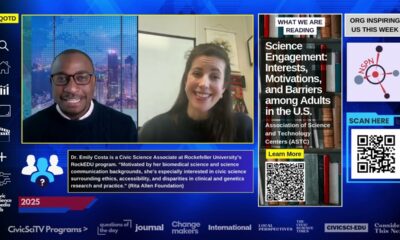Changemakers Program
Science Club for Girls addresses gender inequities in STEM with free programs led by women mentors
Science Club for Girls’ mission is to build excitement, confidence, and literacy in STEM for girls and gender-expansive youth from underrepresented communities.
Victoria Gonzalez of CivicSciTV spoke with Executive Director Bonnie Bertolaet, and Curriculum & Evaluation Manager, Kaelyn Brown, about the free, hands-on, experiential programs they provide by maximizing meaningful interactions with women-in-STEM mentors.
Learn more and get involved at: www.scienceclubforgirls.org
Transcript
Welcome to this Changemakers episode of CivicSciTV. Today, we’ll be highlighting Science Club for Girls, which is a non-profit organization committed to racial and gender equality in STEM. Thank you, Bonnie and Caitlin, for joining me today.
Great to be here.
So, I would love to just get started by hearing a brief introduction from both of you and your role at Science Club for Girls.
Well, I’m Bonnie Bertelight. I’m the Executive Director of Science Club for Girls, and I’ve been in a leadership role at the organization for the last five years.
My name is Caitlin Brown. I’m currently the Curriculum and Evaluation Manager at Science Club for Girls, and I joined this role about two months ago, but I’ve been with Science Club for Girls since I was in first grade, so over 17 years now.
Thank you, guys. I’m definitely very excited to hear more about the mission for the Science Club for Girls and Caitlyn’s journey as well throughout her entire time being in this organization. Bonnie, if you could please tell me a little bit more about the mission for Science Club for Girls and how this organization came about.
Great, I’d be happy to. At Science Club for Girls, our mission is to inspire confidence, excitement, and literacy in STEM, which is science, technology, engineering, and mathematics, for girls and gender-expansive youth, particularly from underrepresented communities. We do this by providing free, hands-on, experiential, participatory programs and by maximizing meaningful relationships with women STEM mentors. At Science Club, we provide a continuum of programming from kindergarten through 12th grade that focuses not only on STEM education but really focuses on the whole child in the context of social-emotional learning and mentorship. Relationships are at the core of our organization, and as a result, for the last 28 years, the focus of our organization has been addressing systemic inequities around gender, race, and socioeconomic factors in STEM. We prioritize serving girls and gender-expansive youth who are the most underrepresented in STEM by race, by family income, and are first in their family to go to college.
It’s definitely a very meaningful mission, and just hearing or seeing the impact that you guys have on young children and how that impacts the future of their career is so wonderful to see. Caitlyn is the perfect example of that since you joined when you were younger. I just want to hear more about your journey and what that has been for you.
Well, I joined Science Club for Girls when I was about six years old and in first grade. We had just moved to Boston and had heard about the program, so my mom put my sister, myself, and my cousin in it. It was actually amazing. As someone who hadn’t really thought about science very deeply in elementary school, it was really awesome not only to have that community every Saturday but also to do these really cool, engaging, hands-on experiments. We got to dissect a cow’s heart, build maps of our own bodies, and track our own digestive tract, which was really cool and different from the more lecture-based things we were doing in school. I loved being able to make my own hypotheses, record those in my journal, and really do the experiment myself. It gave me the opportunity to feel like a real scientist and to feel like I had an impact on these experiments. The program was super engaging, and I made tons of friends. I really looked up to my mentors, many of whom were college students who looked like me and were doing things that were really cool to me. I stuck with the program throughout elementary school and middle school. Then, in eighth grade, I became a junior mentor, which was really cool because I still got to connect with the younger participants. Even though I was in more of a teaching role, it was a bi-directional relationship. I helped the children, but they were also helping me. It gave me a lot of confidence going into high school and doing upper-level STEM classes. Having this community of participants that really looked up to me and being able to build closer bonds with my mentors was very meaningful. In college, I continued to be involved, recruiting mentors from the Harvard community and engaging with the program virtually during the pandemic. It’s been an amazing longitudinal experience, and I know I will always be a part of this community.
That’s wonderful. It really shows how beneficial this organization is, providing the fundamentals of an early STEM education and how that impacted you in high school and now in college. Giving that back to the community and providing mentorship to younger kids is amazing. What do you feel is the most impactful aspect of the program?
I think what’s been really impactful for me has been the curriculum. These concepts are super complex, and to present material in a way that’s inviting and engaging to younger participants is powerful. It’s always powerful to see that aha moment, that epiphany when they understand the science behind a complex topic. Once that information becomes accessible, it leads to confidence that is empowering to see and witness. I love that Science Club for Girls makes this information accessible to such a diverse group of participants. It fosters confidence and gives them the potential to work on scientific problems and make it a career. Seeing that aha moment and the confidence build over the semester has been most impactful and meaningful to me.
I think you described it perfectly. That aha moment is what we strive for. Giving children that confidence early on helps them continue and decide their path, feeling capable of doing big, amazing, and challenging things in STEM. Many kids don’t have the resources, so you guys opening those doors for them is so meaningful. There is such a misconception that the reason for underrepresentation is a lack of interest. When you make programs engaging and accessible, relevant to girls and gender-expansive youth’s lives, they will be eager to participate. Our programs are free so those who need it the most have access. To continue expanding, we need to engage more partners in bringing high-quality STEM education to more youth in the Greater Boston area. At Science Club, we are creating the pipeline for the future diverse, skilled STEM workforce. We address the shortage of STEM workers, underrepresentation of prioritized communities, and the need for increased scientific literacy, which makes for stronger and safer neighborhoods. We create leaders in their own neighborhoods and communities. Every girl, no matter her family’s means or background, deserves access to high-quality, fun STEM education. Representation matters for girls and gender-expansive youth, so they can have role models that look like them and share similar life experiences. We love to enlist your community with us to transform the face of STEM.
What are your hopes for the future of Science Club for Girls?
I’m applying to medical school, and I think Science Club for Girls has imparted many skills I will carry with me as a physician serving underserved and marginalized communities. Science Club taught me to think critically, understand the scientific process, work with people, and be resilient. These are skills applicable to academic work, personal life, and career. The community is strong, has given me amazing friends, and will be a support system throughout my life. I don’t think I’ll ever be completely done with Science Club; the community is always forever.
I’m very inspired by the work you do, and I’m sure many children out there could benefit from these programs. I hope more continue to join and experience these hands-on and fun science experiments. If you are currently in a STEM field and love your work, consider mentoring. The time commitment is minimal, but the rewards are immense. You get to work with amazing emerging leaders and a variety of individuals from different STEM disciplines, education, corporate, government, and museums. Our dynamic, creative, and innovative community brings STEM to more girls and gender-expansive youth.
That’s perfect. I’m very glad you added those points. Hopefully, more people will want to join Science Club for Girls and mentor. I’m excited to see how this organization grows and the impact it continues to have on young girls and their future in STEM.
Thank you so much for this opportunity, Victoria. We really appreciate it.
Thank you so much.
I’m a multimedia journalist and writer based in Boston, MA. I completed my Bachelor’s Degree in Journalism at Emerson College. My minor in Digital Media led me to incorporate my reporting skills to online, print, and audio as technology continues to evolve.
My work has involved reporting local and international topics for WEBN-TV News in Boston and Political & Economic Media in Taiwan. Most of all, I value the process of sharing people’s experiences and elevating diverse voices through the power of storytelling.

-
 Audio Studio1 month ago
Audio Studio1 month ago“Reading it opened up a whole new world.” Kim Steele on building her company ‘Documentaries Don’t Work’
-
Civic Science Observer1 week ago
‘Science policy’ Google searches spiked in 2025. What does that mean?
-
Civic Science Observer1 month ago
Our developing civic science photojournalism experiment: Photos from 2025
-
Civic Science Observer1 month ago
Together again: Day 1 of the 2025 ASTC conference in black and white
Contact
Menu
Designed with WordPress
























